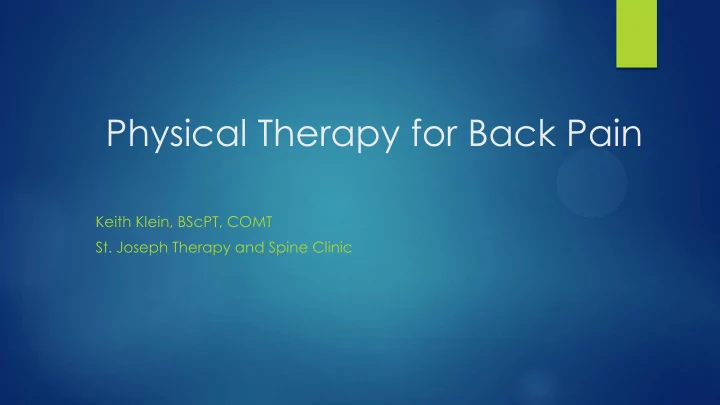

Physical Therapy for Back Pain Keith Klein, BScPT, COMT St. Joseph Therapy and Spine Clinic
Audience Response Question KEITH KLEIN
Audience Response Question
Disclaimer: The presenter has no conflicts of interest to disclose regarding todays presentation.
Case Study Presentation Dorothy, 78, spinal stenosis, neurogenic claudication, grade I spondylolisthesis L45, psychosocial. Chuck, 54, chronic back>leg pain, multilevel DDD with some stenosis, type II diabetes, used to play football, is quitting smoking, psychosocial. Steve, 40, acute disc herniation with radiculopathy, acute nerve pain, mountain biker, medical marijuana, psychosocial.
Dorothy, 78, spinal stenosis, neurogenic claudication, grade I spondylolisthesis L45, psychosocial. Subjective Evaluation Looking at how patient perceives condition, how it is affecting them and their goals. Objective Evaluation Discussion on findings and setting goals
Dorothy, 78, spinal stenosis, neurogenic claudication, grade I spondylolisthesis L45, psychosocial. Probable findings: Flexion alleviation and extension provocation activities Level of deconditioning/fitness/mobility General strength and flexibility neurogenic claudication Fall risk Patient perception of disability
Dorothy, 78 y/o Physical Therapy Treatment Ideas: Patient education on positions of alleviation, activity modification, and adaptive devices Aerobic conditioning Flexibility work Manual therapy Therapeutic exercise Home exercise program
Dorothy, 78 y/o Patient education: Planning activities around manageable symptoms. Flexion Postures and positions for comfort. Sleeping Kitchen Adaptive devices.
Dorothy, 78 Aerobic Conditioning Recumbent Incline versus Unloaded
Dorothy, 78 y/o Manual Therapy Treatment Options must consider comorbidities and health of patient to make best clinical decision. Risk versus Benefit Areas that could be benefit to decrease extension stress off the lower Lumbar spine: Anterior hip Flexibility Posterior pelvis rotation Lumbar flexion Thoracic Spine extension
Dorothy, 78 Flexibility Work Prone Psoas Supine Psoas Modified Thomas
Dorothy, 78 Manual Therapy Mulligan Oblique Facet Technique Muscle Energy Gap Stretch Standing, Sitting, Quadruped
Dorothy, 78 y/o Therapeutic Exercise (Flexion Bias) Posterior Pelvic Rotation Training Quadruped, Sitting, Standing Abdominal Facilitation and Training Functional Training
Dorothy, 78 Therapeutic Exercise (Flexion Bias) Supine to standing Functional Training Quadriped, sit, stand Upright Postures Posterior Pelvic Tilt Posterior Pelvic Tilt with Function Abdominal Muscle Training
Dorothy, 78 y/o Home Exercise Program Flexibility Exercises and Strengthening Exercises Requires patient buy in equaling compliance and consistency. Respect time, perceived challenge, and ease to set up environment
Chuck, 54, chronic back>leg pain, multilevel DDD with some stenosis, type II diabetes, used to play football, is quitting smoking, psychosocial. Subjective Evaluation Looking at how patient perceives condition, how it is affecting them and their goals. Objective Evaluation Discussion on findings and setting goals
Chuck, 54, chronic back>leg pain, multilevel DDD with some stenosis, type II diabetes, used to play football, is quitting smoking, psychosocial. Probable findings: Patient perception of disability and motivation Level of Deconditioning/Fitness/Overall Health Provocation/Alleviation positions and activities
Chuck, 54 y/o Physical Therapy Treatment Ideas: Patient education on positions of alleviation and adaptive devices Aerobic conditioning Therapeutic Exercise Flexibility Exercises Manual therapy Modalities Home exercise program
Steve, 40, acute disc herniation with radiculopathy, acute nerve pain, mountain biker, medical marijuana, psychosocial. Subjective Evaluation Looking at how patient perceives condition, how it is affecting them and their goals. Objective Evaluation Discussion on findings and setting goals
Steve, 40, acute disc herniation with radiculopathy, acute nerve pain, mountain biker, medical marijuana, psychosocial. Possible findings: Lack of knowledge about condition Fear of current and future impact on lifestyle Abnormal Posturing and Gait Gross loss of function Salient sign of radiculopathy down the leg
Steve, 40 y/o Physical Therapy Treatment Ideas: Patient education on positions of alleviation and adaptive devices Modalities Therapeutic Exercise Flexibility Exercises Manual therapy Aerobic conditioning Home exercise program
Steve, 40 y/o Patient education on positions of alleviation, body mechanics, and adaptive devices Positions Supine hook-ly Reclined Self unloading of Lumbar Spine Progressive extension positioning and PROM Avoid prolonged sitting, BLT, prolonged stand and walking Body Mechanics Adaptive devices
Steve, 40 y/o Modalities (Acute) Ice versus Heat Ultrasound Electrical Stimulation
Steve, 40 y/o Manual Therapy Acute Stage Soft Tissue Mobilization Gentle traction Subacute Stage Chronic Stage
Steve, 40 y/o Exercise Progressive exercises based on recovery and position of tolerance. List correction and return to neutral posture Unloaded Lumbar exercises Progressive weight bearing Functional exercises
Steve, 40 y/o List Correction and Neutral Posture Standing Standing with Unloading
Steve, 40 y/o Unloaded exercise Supine Traction Reduced Gravity
Steve, 40 y/o Progressive Weight Bearing Aerobic Conditioning Sitting Standing
Steve, 40/y/o Functional Exercise Back to Work Functional Exercise Return to Recreational Activities Increasing load and/or speed with movement
Steve, 40 y/o Functional Training Squats with Load Torsion Exercise Unstable Surface
Steve, 40 y/o Functional Training Movement Stability with Bike Unstable Surface Control
Steve, 40 y/o Home Exercise Program Requires patient buy in, compliance, and consistency. Respect time, perceived challenge, and ease to set up environment.
Summary of PT involving the three cases presented Treatment progression based on functional improvement without provocation of symptoms. Active approach, except in acute conditions. Patient being an active willing participant seeing value.
References: Thank you to all my mentors over my career for their sharing of knowledge.
Recommend
More recommend